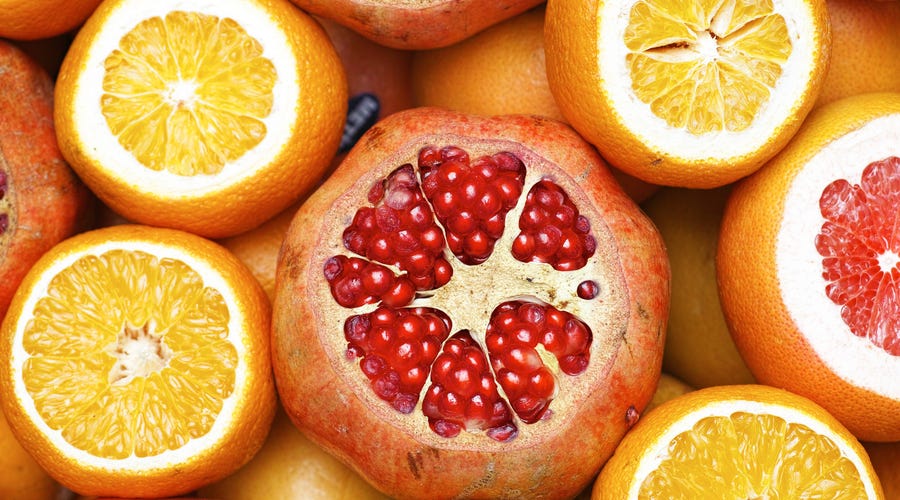Almost everyone likes fruits. They are highly nutritious, rich in vitamins, and good for our health. But there are so many fruits that it can be confusing to identify them all.
While most English speakers - native or not - can name the most common fruits present in their diet regularly, there are many more fruits that you may have never heard of.
By learning how to say fruits in English, you’ll not only appear more knowledgeable on the subject, but you’ll also be able to speak more accurately about your diet and culinary preferences. Plus, you’ll be able to follow delicious recipes for fruity desserts!
To help you name different fruits, we’ve prepared this list of over 120 fruits in English. Botanically speaking, fruits are divided into a few categories, including citruses, pomes, drupes, berries, and aggregate fruits. So, we’ve divided them into categories as well. Additionally, we’ve even included some (quite funny) idioms that will undoubtedly come in handy in many situations.

List of fruits in English
To kick off this list, let’s start with the basics. While it’s clear that “fruit” refers to a single fruit, the plural of this noun can be pretty confusing. So, is the plural form “fruit” or “fruits”? In English, “fruit” is both a countable and uncountable noun. This means that both forms - fruit AND fruits - are correct, but their use depends on the context.
We'd use “fruit” to refer to fruit as a group in general, not as a specific kind of fruit. For example, we could say:
- Tropical fruit tastes the best!
- You should include more fruit in your diet.
However, if we’re referring to fruit as a specific, individual unit in the plural form, it’s correct to use “fruits.” For example, we can say:
- There are so many exotic fruits in this local market!
- My favorite fruits are papaya, strawberry, and dragon fruit!
So now that we’ve got this covered, let’s move on to the list of different fruits in English.
Citrus fruits in English
Citrus fruits are the perfect ingredient for a refreshing, freshly squeezed juice on a summer day. And a lemon pie. We love the lemon pie.
These bright and colorful fruits contain lots of vitamin C, antioxidants, and other nutrients. The most common citrus fruits include lemons, limes, oranges, and grapefruits.
| English | IPA Pronunciation |
|---|---|
| Bitter orange | / ˌbɪtə ˈɒrɪndʒ / |
| Blood orange | / blʌd ˈɒrɪndʒ / |
| Citron | / ˈsɪtrən / |
| Clementine | / ˈklemənˌtaɪn / |
| Grapefruit | / ˈɡreɪpfrut / |
| Jamaican tangelo | / dʒəˈmeɪkən ˈtændʒələʊ / |
| Key lime | / ki laɪm / |
| Kumquat | / ˈkəmkwat / |
| Lemon | / ˈlemən / |
| Lime | / laɪm / |
| Mandarin | / ˈmændərɪn / |
| Orange | / ˈɒrɪndʒ / |
| Persian lime | / ˈpɜʃn̩ laɪm / |
| Pomelo | / ˈpɒmələʊ / |
| Sweet lime | / ˈswit laɪm / |
| Taiwan tangerine | / taɪˈwɑn ˌtændʒəˈrin / |
| Tangelo | / ˈtændʒələʊ / |
| Tangerine | / ˌtændʒəˈrin / |
| Yuzu | / yuzu / |
Stone fruits in English (drupe fruits)
Drupe fruits, sometimes called stone fruits because of their pit, are a type of fleshy fruit that has a hard pit in the center, such as apricots, peaches, and cherries. Some fruits that look like drupes are actually not considered drupes.
For example, an avocado has drupe-like qualities, but it’s classified as a berry. Confusing, we know. Anyway, here’s the list. The good news is, you probably already know some of them!

| English | IPA Pronunciation |
|---|---|
| Apricot | / ˈeɪprɪkɒt / |
| Cherry | / ˈtʃeri / |
| Damson | / ˈdæmzən / |
| Dates | / deɪts / |
| Japanese plum | / ˌdʒæpəˈniz plʌm / |
| Jujube | / ˈdʒudʒub / |
| Nectarine | / ˈnektərɪn / |
| Peach | / pitʃ / |
| Plum | / plʌm / |
| Plumcot | / plʌmkot / |
Pome fruits in English
The term “pome” comes from the Latin word “pomum,” which means an apple. And if you read our article about different fruits in French, you already know that “pomme” in French also means apple. Apples and pears, as well as less known quinces and medlars, are all pomes.

| English | IPA Pronunciation |
|---|---|
| Apple | / ˈæpl̩ / |
| Asian pear | / ˈeɪdʒn̩ peə / |
| Crab apple | / ˈkræb æpl / |
| Loquat | / ˈləʊkwɒt / |
| Medlar | / ˈmedlə / |
| Pear | / peə / |
| Quince | / kwɪns / |
| Rowan | / ˈrəʊən / |
| White sapote | / ˌwaɪt sapote / |
Berries in English
Berries are the fruit of many plants, especially ones that grow in the forest. They’re deliciously sweet, tart, and tangy. Some might even say that they’re berry good!
There are many types of berries, but not all of them are what we call “berries” in English. Some examples of berries that are not called “berries” in English are… bananas, avocados, and tomatoes (yes, tomato is a fruit)!
To add to the confusion, some fruits that we call “berries,” such as strawberries, aren’t technically berries - but more on this below.

| English | IPA Pronunciation |
|---|---|
| Bearberry | / ˈbeəberi / |
| Black currants | / blæk ˈkʌrənts / |
| Blueberry | / ˈbluberi / |
| Boysenberry | / ˌbɔɪsənberi / |
| Caperberry | / ˈkeɪpəberi / |
| Chokeberry | / ˈtʃəʊkberi / |
| Chokecherry | / ˈtʃəʊktʃeri / |
| Cloudberry | / ˈklaʊdberi / |
| Cranberry | / cranberi / |
| Elderberry | / ˈeldəberi / |
| Goji berry | / goji ˈberi / |
| Gooseberry | / ˈɡʊzbəri / |
| Grapes | / ɡreɪps / |
| Huckleberry | / ˈhəkəlberi / |
| Lingonberry | / lingonberi / |
| Physalis (cape gooseberry) | / physalis ˈkeɪp ˈɡʊzbəri / |
| Red currants | / ˈred ˈkʌrənts / |
| Salmonberry | / ˌsæmənberi / |
Aggregate fruits in English
While reading the list of berries we included above, you were probably wondering why we didn’t include strawberries. It’s straw-berries… they’re berries, right?! Well, not in a technical sense. We consider them berries in the culinary sense.
But if we classify them according to the true definition of what a berry is, then no, strawberries are not berries. They’re aggregate fruits. Let us explain: aggregate fruits are fruits that derive from a single flower with multiple ovaries. We don’t blame you if you’re scratching your head.
Here’s a list of aggregate fruits, most of which you know are berries.
| English | IPA Pronunciation |
|---|---|
| Blackberry | / ˈblækbəri / |
| Dewberry | / ˈduˌberi / |
| Mulberry | / ˈmʌlbri / |
| Olallieberry | / olallieberi / |
| Raspberry | / ˈrɑzbəri / |
| Serviceberry (juneberry) | / ˈsɜvɪsberi (dʒunberi) / |
| Strawberry | / ˈstrɔbri / |
Melon fruits in English
There are many different types of melons, but one thing they all have in common is their mouthwatering flavor. These fruits belong to the cucurbit family, together with squash and cucumbers (which are both fruits, not vegetables - more on this later in the article).
Let’s look at the different types of melons, some of which might be new to you.

| English | IPA Pronunciation |
|---|---|
| Ambrosia melon | / æmˈbrəʊziə ˈmelən / |
| Ananas melon | / əˈnɑnəs ˈmelən / |
| Autumn sweet melon | / ˈɔtəm ˈswit ˈmelən / |
| Canary melon | / kəˈneəri ˈmelən / |
| Cantaloupe | / ˈkæntəlup / |
| Casaba melon | / kasabə ˈmelən / |
| Crane melon | / ˈkreɪn ˈmelən / |
| Crenshaw melon | / ˈkrenˌʃɒ ˈmelən / |
| Cucamelon (mouse melon) | / kukəmelən maʊs ˈmelən / |
| Gac melon | / gək ˈmelən / |
| Galia melon | / galia ˈmelən / |
| Honeydew | / ˈhʌnɪdju / |
| Honey globe melon | / ˈhʌni ɡləʊb ˈmelən / |
| Persian melon | / ˈpɜʃn̩ ˈmelən / |
| Santa Claus melon (Christmas melon) | / ˈsæntə klɔz ˈmelən ˈkrɪsməs ˈmelən / |
| Snap melon | / snæp ˈmelən / |
| Watermelon | / ˈwɔtəmelən / |
| Winter melon | / ˈwɪntə ˈmelən / |
Tropical fruits in English
The variety of tropical fruits is astounding! In the Caribbean, you can find all kinds of delicious, fresh fruits pretty much anywhere. And while you probably know the majority of the tropical fruits you can find in the Caribbean, you might only know a few that are native to Southeast Asia, such as jackfruit or the smelly durian.
Here’s a list of tropical fruits you can find around the world in English, with their pronunciation. This list contains a mix of fruits from the different categories mentioned above (or not).

| English | IPA Pronunciation | Types of fruit |
|---|---|---|
| Açai | / əsaɪ / | Berry |
| Banana | / bəˈnɑnə / | Berry |
| Cashew apple | / ˈkæʃu ˈæpl̩ / | Pome |
| Chico fruit (sapodilla) | / ˈtʃiˌkəʊ ˈfrut / | Pome |
| Coconut | / ˈkəʊkənʌt / | Drupe |
| Custard apple (cherimoya) | / ˈkʌstəd æpl / | Pome |
| Dragon fruit (pitaya) | / ˈdræɡən ˈfrut/ | Berry |
| Durian | / durian / | Capsule |
| Fig | / fɪɡ / | Multiple fruit |
| Guayaba | / guayaba / | Berry |
| Jackfruit | / dʒæk frut / | Multiple fruit |
| Kiwi | / ˈkiwi / | Berry |
| Lychee | / ˈlaɪtʃi / | Berry |
| Mango | / ˈmæŋɡəʊ / | Capsule |
| Mangosteen | / ˌmæŋɡəˈstin / | Capsule |
| Muskmelon | / ˈməskˌmelən / | Pepo (a kind of berry) |
| Papaya | / pəˈpaɪə / | Berry |
| Passion fruit | / ˈpæʃn frut / | Pepo |
| Persimmon | / pəˈsɪmən / | Citrus |
| Pineapple | / ˈpaɪnæpl̩ / | Multiple fruit |
| Pomegranate | / ˈpɒmɪɡrænɪt / | Aggregate fruit |
| Rambutan | / rambutan / | Drupe |
| Rose apple | / rəʊz ˈæpl̩ / | Pome |
| Salak | / ˈsælək / | Capsule |
| Soursop (guanabana) | / saʊəsɒp / | Aggregate fruit |
| Star fruit (carambola) | / stɑ ˈfrut / | Berry |
| Tamarind | / ˈtæmərɪnd / | Drupe, legume, or capsule, depending on the type |
Fruits disguised as vegetables
Did you know that tomato is actually a fruit? The same goes for the cucumber. Yes, you read that right - some of the “vegetables” we consume are fruits in disguise! We’re using them as vegetables in salads or savory meals in our kitchen, but botanically speaking, they are considered fruits.
Here’s the list of some identity-stealing fruits that pose as vegetables.
| English | IPA Pronunciation |
|---|---|
| Avocado | / ˌævəˈkɑdəʊ / |
| Bitter melon | / ˌbɪtə ˈmelən / |
| Chilli pepper (capsicum) | / ˈtʃɪli ˈpepə (ˈkæpsɪkəm) / |
| Cucumber | / ˈkjukʌmbə / |
| Eggplant (aubergine) | / ˈeɡplɑnt (ˈəʊbəʒin) / |
| Green beans | / ˈɡrin binz / |
| Okra | / ˈəʊkrə / |
| Olives | / ˈɒlɪvz / |
| Plantain | / ˈplæntɪn / |
| Pumpkin | / ˈpʌmpkɪn / |
| Squash | / skwɒʃ / |
| Sweet bell pepper | / ˈswit bel ˈpepə / |
| Sweet corn | / ˈswit kɔn / |
| Tomato | / təˈmɑtəʊ / |
| Zucchini | / zʊˈkini / |
Idioms with fruits
English speakers love to use metaphorical expressions to convey the meaning of a specific situation. So, the English language has a lot of idioms with the names of fruits! You might already be familiar with expressions like “it’s as easy as pie“ or “it’s the cherry on top.”
Knowing these idioms will help you communicate more fluently in English. It might also help you avoid awkward silences after someone uses a funny-sounding expression that makes no literal sense.
Have a look at these eight examples of fruit idioms:
| Idiom | Meaning |
|---|---|
| To be a bad apple | To be a bad person |
| To compare apples and oranges | To compare two completely different things that are not comparable |
| To be the apple of someone’s eye | To be very important to someone |
| To go bananas | To go crazy or to get angry |
| To be a peach | To be very sweet and kind (like a peach) |
| To be as cool as a cucumber | To maintain calm |
| To be the cherry on top | To be the final touch that makes something perfect |
| Not to give a fig | Not to care at all |
Tips for learning the names of fruits in English

Watch cooking videos in English
You might think that learning English is a piece of cake, but it can be as slippery as a bowl of mashed bananas. You’ll need a healthy dose of this secret weapon to get you through memorizing words and learning how to pronounce them: YouTube!
We know, we know - YouTube can be a true rabbit hole! But with the right videos, it can be an invaluable tool for learning English. So, here are some delicious recipes with fruits:
- Lemon Icebox Pie in 5 Minutes with Emmy Made
- 5 Easy Fruit Sorbets with The Domestic Geek
- The Best Fruit Tarts with Preppy Kitchen
- The Only Apple Pie Recipe You’ll Need, according to Natasha’s Kitchen
- Avocado Ice Cream recipe by Cooking with Coit
Go fruit shopping at a market or supermarket in English
When you go to the supermarket, you might feel at a loss if you don’t know any useful phrases to buy fruits. To help you out, here are some words and expressions that will come in handy when fruit shopping at a local market or a supermarket in English. You can adjust them to reflect whatever you want to buy.
- Can I have 2 kilograms of apples?
- I’ll take a dozen lemons, please.
- I’d like to buy bananas.
- How much is a pound of cherries?
- Are these avocados ripe?
- Have you got grapes?
When life gives you lemons, make lemonade!
Now that you know the names of popular, exotic and rare fruits, it’s time to use them in practice. We hope that thanks to this list, you’ll be able to easily communicate at the supermarket, confidently visit the local fruit market, or discuss fruits with a friend.
But before you do that, take a break, grab yourself some delicious fruit and learn about different vegetables in English to round up your food vocabulary.
Want even more? Learn English vocabulary for free on our English vocabulary blog.



